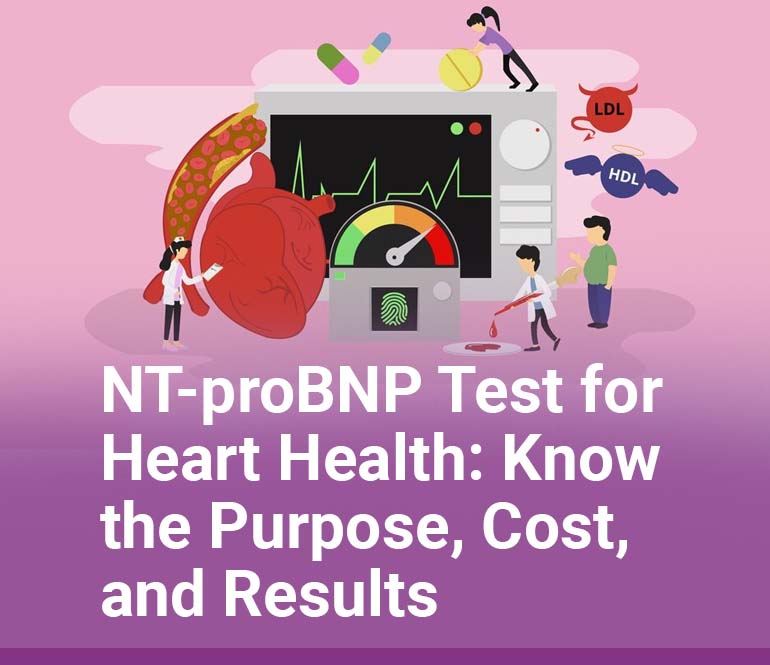Despite the fact that heart health is essential to overall wellbeing, cardiovascular diseases (CVDs) continue to rank among the world’s top causes of death. Early detection techniques like the NT-proBNP test have been revolutionary in diagnosing and treating cardiac disorders due to advances in medical science. This simple blood analysis test can help diagnose and treat heart failure (HF) and provides important information about the health of your heart. Let’s examine the NT-proBNP test’s goals, methodology, cost, and interpretation to see why it is important.
The NT-proBNP Test: What is it?
The N-terminal pro-B-type Natriuretic Peptide (NT-proBNP) test quantifies the amount of a particular protein that your heart releases into your blood. When the heart is stressed or working harder than usual, this protein, known as NT-proBNP, is created. Increased NT-proBNP levels frequently signify cardiac strain, which may be brought on by coronary artery disease, heart failure, or other cardiovascular disorders.
The NT-proBNP Test’s Purpose
- Early Heart Failure Detection: Even before obvious symptoms appear, NT-proBNP levels are an early warning sign of heart failure.
- Monitoring Current Conditions: The test aids in tracking the development of cardiac disorders and evaluating how well treatments are working.
- Differentiating the Causes of Breathlessness: It helps determine whether heart failure or other conditions, such as lung disorders, are the reason of shortness of breath.
- Risk Assessment in High-Risk Individuals: The test can forecast possible heart-related issues in individuals with risk factors such as diabetes, hypertension, or a history of heart disease.
To avail early NT-proBNP Test services book your appointment with Mediscan Labs today!
How to Find out Your Risk for Heart Failure
Heart failure can gradually worsen without any obvious symptoms until it reaches a severe stage. Early risk identification is essential for successful management and prevention. A simple NT-proBNP test from MediscanLab can reveal important information about the condition of your heart. This test determines whether your heart is under stress and how well it is working by evaluating the amounts of NT-proBNP in your blood.
- People who smoke, are obese, have chronic kidney illness, or have a family history of heart disease should think about getting this test. Healthcare professionals can suggest lifestyle modifications or therapies to lower your risk of heart failure if they find it early.
Diabetics: A Higher Risk of Heart Failure
Diabetes, a chronic condition affecting millions worldwide, can significantly increase your risk of heart failure. High blood sugar levels can damage blood vessels over time, leading to heart complications. If you have diabetes, it’s crucial to monitor your blood sugar levels regularly, maintain a healthy lifestyle, and consult with your doctor to assess your risk for heart failure. Early detection and timely intervention can help prevent serious heart complications and improve your overall health.
Check Out: Diabetes Care: The Top 4 Regular Tests You Need
The NT-proBNP Test: Who Should Take It?
- People with Heart Failure Symptoms: This test can determine whether heart failure is the underlying cause of your exhaustion, leg edema, or dyspnea.
- High-Risk Individuals: Regular monitoring is beneficial for people with diabetes, high blood pressure, or a history of heart disease.
- Elderly Population: NT-proBNP levels can serve as an early warning system for heart issues, which are more likely to occur as people age.
- Patients Receiving Heart Treatments: It aids in assessing how well treatments and drugs work.
Process: What to anticipate
The NT-proBNP test is a simple blood test that needs very little setup. This is what occurs:
- Preparation: Unless your doctor instructs you otherwise, there is no need for fasting or specific preparations.
- Sample Collection: A tiny sample of blood is taken from a vein in your arm by a medical practitioner.
- Laboratory Analysis: To determine the amounts of NT-proBNP, the blood sample is examined in a lab.
- Results: Depending on the facility, results are typically ready in a day or two.
The NT-proBNP Test’s cost
Concerned about heart health? MediscanLab offers affordable NT-proBNP tests for just INR 1300. This simple blood test can help detect early signs of heart failure. For added convenience, home sample collection services are also available.
Understanding the Results of the NT-proBNP Test
NT-proBNP levels are interpreted differently depending on underlying medical problems, age, and sex. In general:
- Normal Levels: Less than 125 pg/mL for people under 75 and less than 450 pg/mL for people over 75.
- Elevated Levels: Heart failure or other cardiovascular problems may be the cause of elevated NT-proBNP levels, which signify stress on the heart. In older people, levels above 900 pg/mL are very worrisome.
- What Elevated Levels Mean: Although cardiac strain is clearly suggested by elevated levels, other illnesses such as renal disease, pulmonary hypertension, or serious infections can also cause them. Therefore, in addition to other clinical findings, your doctor will take NT-proBNP levels into account.
NT-proBNP Test Advantages
- Early Intervention: Identifies any cardiac problems before symptoms get worse.
- Personalized Treatment: Assists physicians in customizing care according on the severity of the ailment.
- Better Results: By preventing problems by early detection and action, the prognosis can be improved overall.
- Quick and Non-Invasive: This straightforward blood test yields results quickly and requires little preparation.
NT-proBNP Test Limitations
Despite its great effectiveness, the NT-proBNP test has many drawbacks.
- It is unable to identify the precise source of cardiac stress.
- NT-proBNP levels can also rise as a result of certain illnesses, such as renal impairment.
- It must always be read in conjunction with other diagnostic instruments and clinical assessments.
Lifestyle Advice to Promote Heart Health
Maintaining a heart-healthy lifestyle is crucial to avoiding difficulties in the future, even if your NT-proBNP levels are normal. Here are some pointers:
- Eat a Balanced Diet: Consume a well-rounded diet by emphasizing whole grains, lean meats, fruits, and vegetables.
- Exercise Frequently: Every week, complete at least 150 minutes of moderate-intensity aerobic exercise.
- Reduce stress by engaging in mindfulness exercises, yoga, or meditation.
- Give Up Smoking: The risk of heart disease is greatly increased by smoking.
- Frequent Checkups: Early problem detection is aided by routine health
Conclusion
In the early diagnosis and treatment of cardiac disorders, particularly heart failure, the NT-proBNP test is an effective tool. Knowing your NT-proBNP levels with MediscanLab will help you and your doctor make well-informed decisions regarding your heart health. Offering a glimpse into your cardiovascular health, this test can be life-saving whether you are at risk or already managing a cardiac issue. To receive tailored guidance based on your test findings and general health, always speak with MediscanLab Expert healthcare provider.
Frequently Asked Questions
What is detected by the NT-proBNP test?
Answer:It finds high NT-proBNP levels, which could be a sign of heart failure or stress.
How do I prepare for the NT-proBNP test?
Answer:It’s a straightforward blood test, therefore no additional preparation is required.
Are elevated NT-proBNP levels indicative of anything except heart failure?
Answer:Indeed, certain infections or illnesses such renal disease can also result in increased levels.
What is the price of the NT-proBNP test?
Answer:Each laboratory has a different price. Make an appointment with MediscanLab to learn more.
How may high amounts of NT-proBNP be reduced?
Answer:Manage underlying illnesses, live a heart-healthy lifestyle, and heed medical recommendations.



